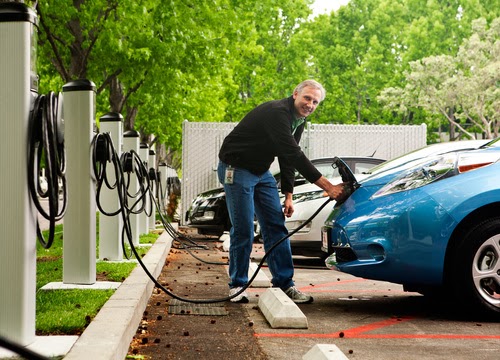At the risk of some he-said-she-said reporting let me return to the story of Kaveh Kamooneh, and his supposed “theft” of a little bit of electricity. He has returned to the media to tell his side of the story![]() , after the Police told their side of the story, after his original telling of his side of the story was aired on local television and a story that went viral. The first version of this story was SHOCK, Some Guy Was Arrested for Stealing $0.05 of Electricity, Something Is Wrong. The second version was that not only hadn’t he asked for permission, he had been explicitly asked to never charge from that power outlet again. In this version we hear that the Police had it wrong, and that Kamooneh wants to paint himself as a hero pushing as hard as the rest of us for electric vehicle adoption.
, after the Police told their side of the story, after his original telling of his side of the story was aired on local television and a story that went viral. The first version of this story was SHOCK, Some Guy Was Arrested for Stealing $0.05 of Electricity, Something Is Wrong. The second version was that not only hadn’t he asked for permission, he had been explicitly asked to never charge from that power outlet again. In this version we hear that the Police had it wrong, and that Kamooneh wants to paint himself as a hero pushing as hard as the rest of us for electric vehicle adoption.
What I say is that the details of this case don’t exactly matter to us. They matter a lot to Mr. Kamooneh and the Chamblee Police Department, both of whom have credibility on the line, and the truth is probably somewhere in the middle between their stories.
What matters are some higher level principles about seeking electrical fuel for our electric vehicles. This story is a case in point for several principles. I’ve written at greater length previously on EV Charging Etiquette.
- Theft is theft even when it’s a few pennies of electricity.
- Permission to use a resource is key to whether it’s appropriate to use that resource.
- Some organizations get overly strict about giving stuff away, like electricity.
- Electricity may be ubiquitous but its’ availability may be prohibited by power outlet owners.
- We are ambassadors of a new kind of vehicle, and have to act agreeably and informatively with those around us.
I’m not saying Mr. Kamooneh actually stole the electricity – he may have had permission, I don’t know the truth of whether he had permission or not. I only know that he tells one story while the police tell another.
Let’s start by abstracting away the details and study the kernel of the story. Namely, rogue use of a power outlet, something that nearly all electric car owners do. A compounding factor can be a power outlet owner who explicitly tells people to not use it to charge electric cars.
Anyone who had been explicitly instructed to not use a power outlet, but went ahead and did so, has stolen electricity.
Some organizations may not care if they find someone plugged into their power outlet. Others will not only care, but will make a legal case out of it.
Nearly all electric vehicle owners do occasional rogue charging at available power outlets. I sure do. When possible, I ask for permission, but it’s not always possible to do so.
What would be ideal is there be enough publicly available high(er) speed charging outlets that it’s simply unnecessary to seek the rogue power outlet.
Any rogue charging runs the risk of a negative confrontation, because it’s not a power outlet that’s explicitly for electric vehicle charging. Even though one may have had hundreds of rogue charging sessions with no incident, one might find that one power outlet whose owner gets incensed over stolen electricity and who rains the full weight of the law down upon ones head.
Such incidents set us all back on the quest for universal electric vehicle adoption.
Public power outlets explicitly designated for electric vehicle charging are what we want. It does no good to take actions which carry the risk of negative confrontation. We should act as ambassadors, and not assume we are more privileged or saintly than others just because we’re driving an electric car.
(to make it clear – I’m not claiming Mr. Kamooneh is guilty of anything, because I don’t know him and do not know whether it applies to him – I’m explaining higher level principles)
- Highway design could decrease death and injury risk, if “we” chose smarter designs - March 28, 2015
- GM really did trademark “range anxiety”, only later to abandon that mark - March 25, 2015
- US Government releases new regulations on hydraulic fracturing, that some call “toothless” - March 20, 2015
- Tesla Motors magic pill to solve range anxiety doesn’t quite instill range confidence - March 19, 2015
- Update on Galena IL oil train – 21 cars involved, which were the supposedly safer CP1232 design - March 7, 2015
- Another oil bomb train – why are they shipping crude oil by train? – Symptoms of fossil fuel addiction - March 6, 2015
- Chevron relinquishes fracking in Romania, as part of broader pull-out from Eastern European fracking operations - February 22, 2015
- Answer anti- electric car articles with truth and pride – truth outshines all distortions - February 19, 2015
- Apple taking big risk on developing a car? Please, Apple, don’t go there! - February 16, 2015
- Toyota, Nissan, Honda working on Japanese fuel cell infrastructure for Japanese government - February 12, 2015











